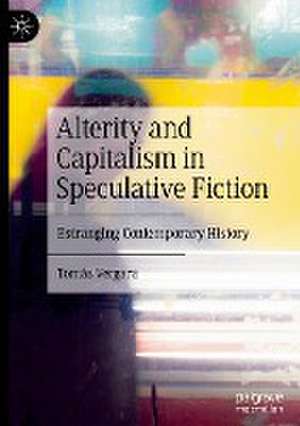Alterity and Capitalism in Speculative Fiction: Estranging Contemporary History
Autor Tomás Vergaraen Limba Engleză Hardback – 6 oct 2023
Preț: 726.55 lei
Preț vechi: 886.03 lei
-18% Nou
Puncte Express: 1090
Preț estimativ în valută:
139.06€ • 143.31$ • 117.40£
139.06€ • 143.31$ • 117.40£
Carte tipărită la comandă
Livrare economică 03-17 martie
Preluare comenzi: 021 569.72.76
Specificații
ISBN-13: 9783031399237
ISBN-10: 3031399234
Ilustrații: IX, 206 p.
Dimensiuni: 148 x 210 mm
Greutate: 0.41 kg
Ediția:1st ed. 2023
Editura: Springer Nature Switzerland
Colecția Palgrave Macmillan
Locul publicării:Cham, Switzerland
ISBN-10: 3031399234
Ilustrații: IX, 206 p.
Dimensiuni: 148 x 210 mm
Greutate: 0.41 kg
Ediția:1st ed. 2023
Editura: Springer Nature Switzerland
Colecția Palgrave Macmillan
Locul publicării:Cham, Switzerland
Cuprins
Chapter 1: Introduction: Anamorphic Estrangement.- Chapter 2: Marxism as Narrative World-Building Method: New Weird Fiction and Capitalist Crisis in China Miéville’s Bas-Lag Trilogy.- Chapter 3: The Afterlives of Slavery: Spectres of the Antebellum in Colson Whitehead’s The Underground Railroad and Rivers Solomon’s Sorrowland.- Chapter 4: Challenging Cultural Studies Through Dystopia: Catatonic Cultural Dominant in Noon’s Falling Out of Cars and McCormack’s Notes from a Coma.- Chapter 5: Extrapolation and Social Reproduction: Anne Charnock’s Dreams Before the Start of Time and Bina Shah’s Before She Sleep.- Chapter 6: Conclusion: New Horizons for a Marxist Theory of Speculative Fiction.
Notă biografică
Tomás Vergara completed his Ph.D. in English Literature at the University of Edinburgh, UK. He is a lecturer in English at Pontificia Universidad Católica de Valparaíso, Chile. His research interests are focused on speculative fiction, Marxist literary criticism and the environmental humanities. This interest ranges from early forms of science fiction and the Gothic in Victorian literature to the dystopian imaginaries of cyberpunk in Bruce Sterling and William Gibson, and the radical alterity of China Miéville’s New Weird fiction attempting to weaponize the fantastic to revitalise the imaginary of revolution. The particular focus on speculative fiction is a consequence of this broader interest in the fantastic. Tomás has published an article on Jeff Noon’s Falling out of Cars in the C21 Literature journal.
Textul de pe ultima copertă
"As the storm called progress piles wreckage at our feet, speculative fiction is now key to articulating catastrophe. Through paranoid ontologies, anamorphic estrangements, counterfactual energies, crisis historicity, forestalled extrapolations and catatonic thrum, writers like China Miéville and Rivers Solomon, Bina Shah and Colson Whitehead estrange the death throes of a terminal capitalism that refuses to die until it has asset-stripped the world of all possibilities. This is heady stuff and Vergara a critic to be heeded".
—Mark Bould, Professor of Film and Literature, UWE Bristol
—Mark Bould, Professor of Film and Literature, UWE Bristol
Tomás Vergara completed his Ph.D. in English Literature at the University of Edinburgh, UK. He is a lecturer in English at Pontificia Universidad Católica de Valparaíso, Chile. His research interests are focused on speculative fiction, Marxist literary criticism and the environmental humanities. This interest rangesfrom early forms of science fiction and the Gothic in Victorian literature to the dystopian imaginaries of cyberpunk in Bruce Sterling and William Gibson, and the radical alterity of China Miéville’s New Weird fiction attempting to weaponize the fantastic to revitalise the imaginary of revolution. The particular focus on speculative fiction is a consequence of this broader interest in the fantastic. Tomás has published an article on Jeff Noon’s Falling out of Cars in the C21 Literature journal.
Caracteristici
Explores the political potential shared by all speculative fiction Draws on an alternative genealogy of Marxist criticism Posits that speculative fiction performs an estrangement effect on historical reality
